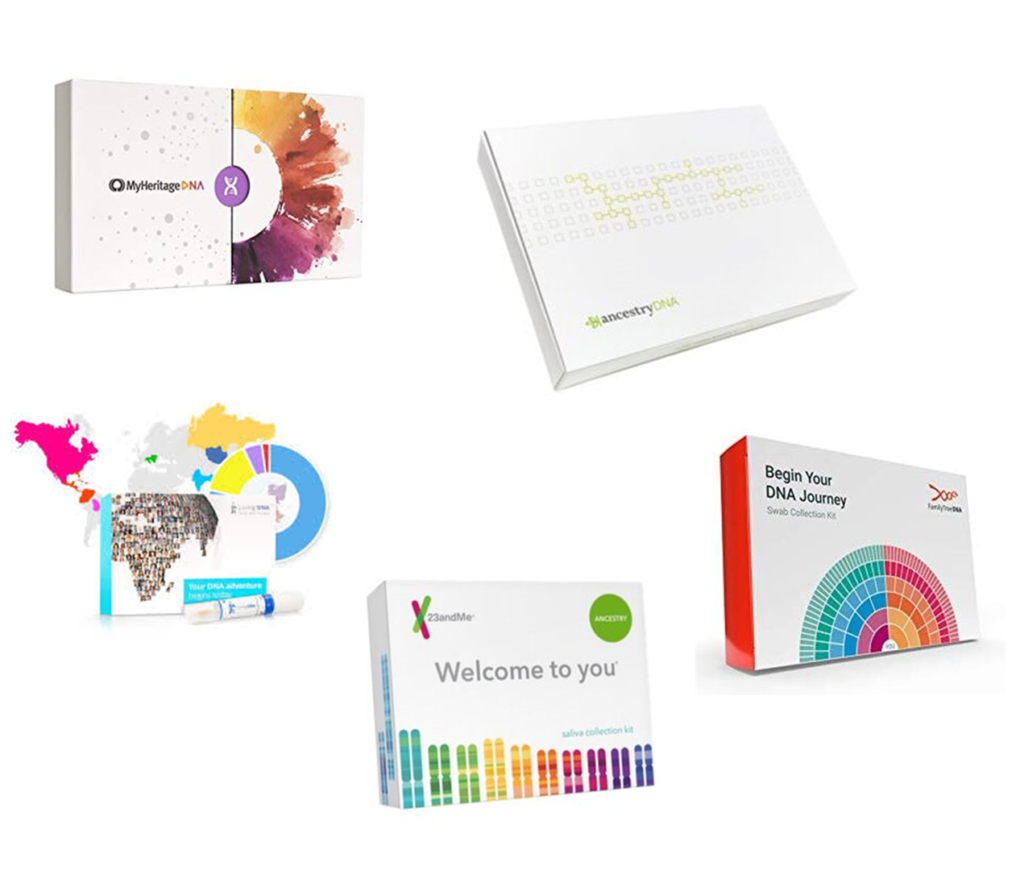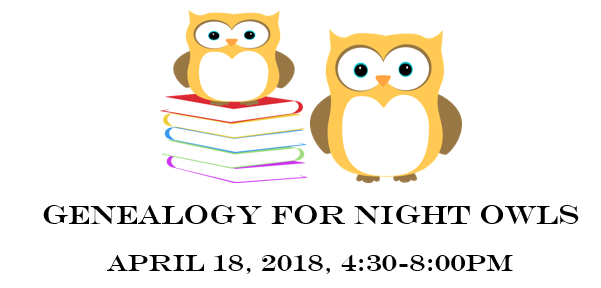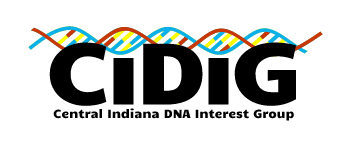Do you know who your ancestors are? Do you know which countries they came from? Did you know that taking a DNA test will help you discover your own ethnicity estimates?
I’d like to briefly highlight five major DNA testing companies in order to acquaint you with what each company has to offer. There are many more DNA testing companies available, but this article will compare five major companies. But first, let’s briefly talk about the basics of DNA. I’m not a science person, so this will definitely be a very basic explanation. I went into a DNA test without any knowledge of DNA except that I knew it as the carrier of genetic information and that our DNA is arranged into chromosomes, grouped into 23 pairs. I could also recognize the double helix images of DNA structure.
It’s important to keep in mind that siblings in a family do not inherit the exact same DNA from their parents as another sibling inherits. When I first had my DNA tested it was after my sister had hers tested. Remember now, I told you I’m not a science person, so I assumed that my ethnicity estimates from my DNA would be the same as my sister’s ethnicity estimates. We have the same mother and father, so I thought we would have the same ethnicity estimates. Wrong! I’ve been hooked and fascinated with DNA genetics ever since.
I later learned that everyone gets half of their DNA from their mother and half from their father. Which DNA is inherited from each parent is totally random. Inherited DNA is reduced each generation, as you can see by a table from 23andMe, “Average Percent DNA Shared Between Relatives,” that summarizes both the average percent DNA shared for different types of relationships, and the expected range of percent DNA shared. For example, we inherit 50% DNA from each parent, about 25% DNA from each grandparent, about 12.5% DNA from each great-grandparent, and so on.
Ancestry has a great article on understanding inheritance:
“By understanding how DNA is inherited, you can see how and why you have some DNA segments that match your relatives, and others that do not, why you may or may not have inherited DNA segments associated with a certain ethnicity, and why getting multiple people in your family tested can help you discover more of your family’s genetic tree.”
Let’s talk ethnicity estimates. To date, no ethnicity gene has been found in the human genome. Your own ethnicity estimate is just that, an estimate. It is based upon comparing your DNA with known members of different ethnicities in the testing company database. By this comparison they will estimate how closely your DNA matches with each ethnic group. All of the testing companies I’m comparing will give you ethnicity estimates. The picture below is a screenshot of my own ethnicity estimate from Ancestry. I took my DNA test from Ancestry about eight years ago. The screenshot shows that my DNA is about 70% from Ireland. On the right side of the screenshot and directly underneath Ireland, there are particular regions and towns of Ireland where they estimate my ancestors lived. Then it estimates that I have 20% DNA from Scotland, 8% DNA from England and Northwestern Europe and about 2% Germanic Europe.
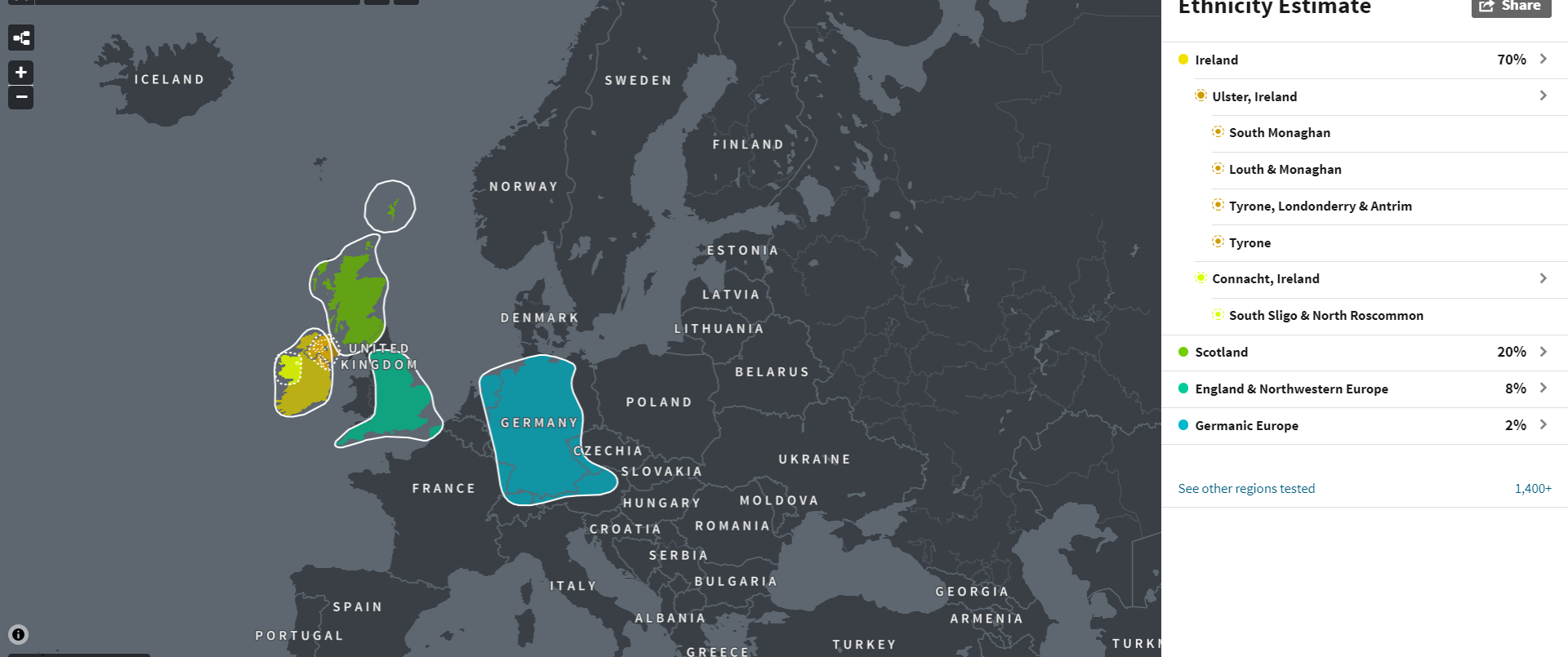 My sister and I had researched our genealogy long before we each took a DNA test. Plus, with family history and stories passed down, we knew we had strong ties back to Ireland. With the maiden name of McNamara, that’s a given. We also have these very Irish surnames on our family tree: Murphy, Farrell, McKeown, Kelly, MacMeehan, Flannery and Murray. We also have our great, great, great grandfather Patrick MacDonald born in Glencoe, Argyll, Scotland around 1790. As a young man he went to Ireland and married Susan Murray. They lived and raised their family in County Monaghan, Ireland before emigrating to Ontario, Canada. You’ll note that County Monaghan is one of the areas mentioned in my ethnicity estimate above.
My sister and I had researched our genealogy long before we each took a DNA test. Plus, with family history and stories passed down, we knew we had strong ties back to Ireland. With the maiden name of McNamara, that’s a given. We also have these very Irish surnames on our family tree: Murphy, Farrell, McKeown, Kelly, MacMeehan, Flannery and Murray. We also have our great, great, great grandfather Patrick MacDonald born in Glencoe, Argyll, Scotland around 1790. As a young man he went to Ireland and married Susan Murray. They lived and raised their family in County Monaghan, Ireland before emigrating to Ontario, Canada. You’ll note that County Monaghan is one of the areas mentioned in my ethnicity estimate above.
Below is a screenshot from Ancestry that shows a comparison of the ethnicity estimates for me and my sister. There are some very real differences here. She has 8% DNA from Germanic Europe, where I only have 2% in my DNA. It’s interesting to note that we also have many German names in our tree, including Metz, Demer, Spitzmesser and Burkhardt. She seems to have inherited more of the German DNA and about twice as much English and Northwestern European DNA in our family than I have inherited.
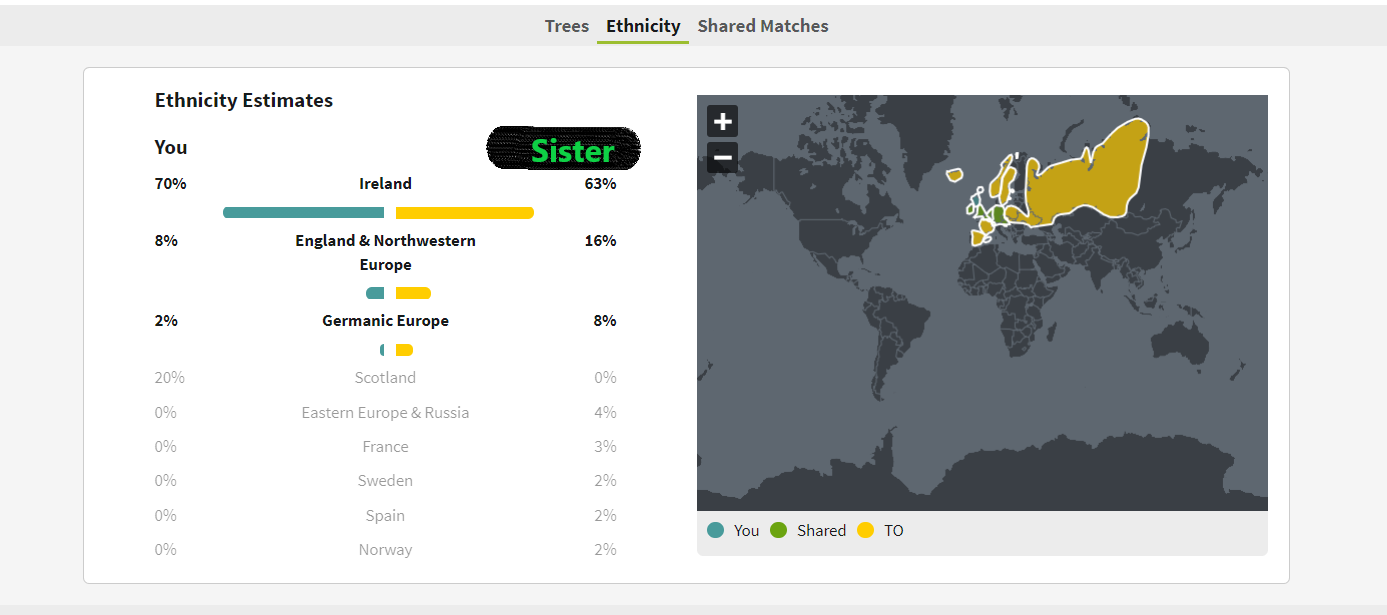 Along with ethnicity estimates, all of the companies I will be comparing also name relatives that are genetic DNA matches. My matches include thousands of people on Ancestry that share some of my DNA, thus we are related to one another. This was mind boggling to me! They are listed from closest relation – my sister – to matches that share less than 1% DNA with me. Unfortunately, I have not had much time to explore these matches other than the cousins I already know about. Interestingly though, a distant cousin, unbeknownst to us, contacted my sister a few years ago and they’ve been emailing ever since. This distant cousin lives in Ontario, Canada and is related to our Scottish MacDonald clan that emigrated there in the 1800’s. She has been able to fill us in on a lot of that family history that we had not known before, along with sharing some photographs too. It’s up to each individual as to how much you want to pursue the DNA matches you find out about.
Along with ethnicity estimates, all of the companies I will be comparing also name relatives that are genetic DNA matches. My matches include thousands of people on Ancestry that share some of my DNA, thus we are related to one another. This was mind boggling to me! They are listed from closest relation – my sister – to matches that share less than 1% DNA with me. Unfortunately, I have not had much time to explore these matches other than the cousins I already know about. Interestingly though, a distant cousin, unbeknownst to us, contacted my sister a few years ago and they’ve been emailing ever since. This distant cousin lives in Ontario, Canada and is related to our Scottish MacDonald clan that emigrated there in the 1800’s. She has been able to fill us in on a lot of that family history that we had not known before, along with sharing some photographs too. It’s up to each individual as to how much you want to pursue the DNA matches you find out about.
According to Genetics Digest, there are three essential tips you must know before buying a DNA Test.
- Buy from a company that protects your data.
- Find a test that reveals when and where your ancestors appeared.
- Follow the science and genetic experts.
I would like to add that it’s important to look over each company’s website and learn about what they offer. Read the FAQ’s and comments from users. Also, decide what is important to you and what you hope to learn by having your DNA tested. The price of the kits range from $79 -$99, but keep an eye on their websites around different holiday times for sales on the kits.
One more thing to consider before taking a DNA genetic test is that there might be information disclosed to you that you weren’t expecting: adoptions, illegitimacies, name changes and non-paternal events, where parentage may be unexpected. It is suggested to be emotionally prepared for whatever the results of the testing shows.
I have prepared a chart that compares these five different DNA testing companies: MyHeritage, Ancestry, Living DNA, Family Tree DNA and 23andMe. The comparison chart covers such criteria as the number of geographic regions each test company covers, health and well being upgrade availability, personal traits upgrade availability, exploration of ancient ancestry, advanced DNA testing availability, ability to upload DNA test results to other company sites, ancestry timeline, tracking possible migration routes, cost and other features.
Additionally, here is just a sampling of some of the DNA related books we have in our Genealogy Collection. Come visit us sometime and take a look at them. As of this writing in April of 2021, we are open, but require patrons to make an appointment first. You can make an appointment by calling us at 317-232-3689 or through our Ask-a-Librarian service.
 Also, if you are interested in learning more about this fascinating subject, we invite you to attend our “Virtual DNA Workshop” scheduled to take place in May of 2021.
Also, if you are interested in learning more about this fascinating subject, we invite you to attend our “Virtual DNA Workshop” scheduled to take place in May of 2021.
The Indiana State Library Genealogy Division and the Central Indiana DNA Interest Group are partnering to present a “Virtual DNA Workshop” from 11:30 a.m. to 3:30 p.m. on Saturday, May 8, 2021. This is a free event, but registration is limited to the first 200 people. It will take place via Zoom.
The workshop will focus on using various DNA tools to understand how people are connected to their DNA matches. Speakers from CIDIG will cover topics on understanding genetic genealogy; reviewing DNA results; comparing shared matches; building family trees based upon DNA matches; and using various DNA tools to analyze matches. Using the Zoom chat feature, attendees will be able to submit questions during the sessions and during the panel discussion at the end of the program.
Disclaimer: The author of this blog and the Indiana State Library in no way endorse any of the DNA testing companies referred to in this blog. The existence of the provided links do no imply endorsement of the services or products of these companies.
Bibliography:
23andME
Ancestry DNA
Central Indiana DNA Interest Group
Family Search Wiki. DNA Basics
Family Tree DNA
International Society of Genetic Genealogy; Genetics Glossary
International Society of Genetic Genealogy; Wiki, Autosomal DNA statistics
Living DNA
My Heritage DNA
This blog post was submitted by Genealogy Division librarian Alice Winslow. For more information, contact the Genealogy Division of the Indiana State Library at 317-232-3689 or submit an Ask-a-Librarian request.

